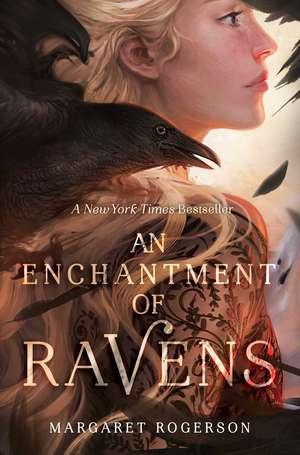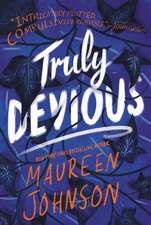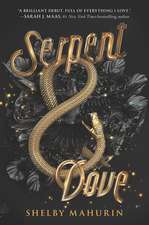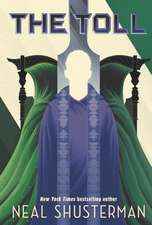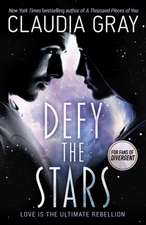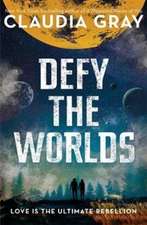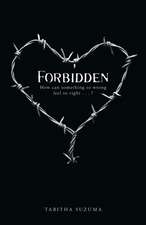An Enchantment of Ravens
Autor Margaret Rogersonen Limba Engleză Paperback – 15 noi 2018 – vârsta de la 14 ani
An Indie Next Top 10 Pick
A Parents’ Choice Silver Honor Winner
“A funny, action-packed, and sweet romance.” —School Library Journal(starred review)
“A phenomenal read.” —RT Book Reviews
A skilled painter must stand up to the ancient power of the faerie courts—even as she falls in love with a faerie prince—in this gorgeous bestseller that’s “an ideal pick for fans of Holly Black, Maggie Stiefvater, and Laini Taylor” (Publishers Weekly, starred review).
Isobel is an artistic prodigy with a dangerous set of clients: the sinister fair folk, immortal creatures who cannot bake bread or put a pen to paper without crumbling to dust. They crave human Craft with a terrible thirst, and Isobel’s paintings are highly prized. But when she receives her first royal patron—Rook, the autumn prince—she makes a terrible mistake. She paints mortal sorrow in his eyes—a weakness that could cost him his life.
Furious, Rook spirits her away to his kingdom to stand trial for her crime. But something is seriously wrong in his world, and they are attacked from every side. With Isobel and Rook depending on each other for survival, their alliance blossoms into trust, then love—and that love violates the fair folks’ ruthless laws. Now both of their lives are forfeit, unless Isobel can use her skill as an artist to fight the fairy courts. Because secretly, her Craft represents a threat the fair folk have never faced in all the millennia of their unchanging lives: for the first time, her portraits have the power to make them feel.
| Toate formatele și edițiile | Preț | Express |
|---|---|---|
| Paperback (2) | 57.41 lei 3-5 săpt. | +9.15 lei 7-13 zile |
| Simon&Schuster – 11 mai 2022 | 57.41 lei 3-5 săpt. | +9.15 lei 7-13 zile |
| Margaret K. McElderry Books – 15 noi 2018 | 73.97 lei 3-5 săpt. | |
| Hardback (1) | 115.74 lei 3-5 săpt. | |
| Margaret K. McElderry Books – 26 sep 2017 | 115.74 lei 3-5 săpt. |
Preț: 73.97 lei
Nou
14.15€ • 14.83$ • 11.70£
Carte disponibilă
Livrare economică 21 martie-04 aprilie
Specificații
ISBN-10: 1481497596
Pagini: 320
Ilustrații: 6c cvr (4C+2 hits opaque white) (spfx: spot gloss) metallic stock w- matte finish; digital
Dimensiuni: 140 x 210 x 18 mm
Greutate: 0.27 kg
Ediția:Reprint
Editura: Margaret K. McElderry Books
Colecția Margaret K. McElderry Books
Notă biografică
Margaret Rogerson is the author of the New York Times bestsellers An Enchantment of Ravens and Sorcery of Thorns. She has a bachelor’s degree in cultural anthropology from Miami University. When not reading or writing she enjoys sketching, gaming, making pudding, and watching more documentaries than is socially acceptable (according to some). She lives near Cincinnati, Ohio, beside a garden full of hummingbirds and roses. Visit her at MargaretRogerson.com.
Recenzii
* "Rogerson turns forbidden love into fresh adventure with danger, chases, a glorious ball, and unexpected narrative turns. Readers will delight in her interpretation of classic fairy themes and lore, and in the humor laced into the story...An ideal pick for fans of Holly Black, Maggie Stiefvater, and Laini Taylor."
"An Enchantment of Ravens offers a beautifully built world and swiftly paced adventure with exactly the right amount of danger, heroics and romance."
"Rogerson’s deft way with words and world building lifts tension and interest to a high point. An excellent choice for fans of Holly Black and Neil Gaiman."
"Rogerson draws on fairy lore while changing myriad details to suit her story, and in Isobel she provides a strong, confident heroine who may lose her heart but never her head. No glamour is needed to make readers fall for this one."
"The setting is deftly conveyed through dialogue and character interactions, thus avoiding any heavy exposition, and Rogerson keeps a nice balance between the development of Isobel and Rook’s relationship and the action of the plot. The book’s final clash between faerie and mortal is thrilling, but the motivations of the major villain have a touching resonance with Isobel and Rook’s inescapable reality as mortal and immortal lovers. Fans of May’s The Falconer (BCCB 6/14) will happily flock to this tale"
Descriere
An instant New York Times bestseller!
An Indie Next Top 10 Pick
A Parents’ Choice Silver Honor Winner
“A funny, action-packed, and sweet romance.” —School Library Journal (starred review)
“A phenomenal read.” —RT Book Reviews
A skilled painter must stand up to the ancient power of the faerie courts—even as she falls in love with a faerie prince—in this gorgeous bestseller that’s “an ideal pick for fans of Holly Black, Maggie Stiefvater, and Laini Taylor” (Publishers Weekly, starred review).
Isobel is an artistic prodigy with a dangerous set of clients: the sinister fair folk, immortal creatures who cannot bake bread or put a pen to paper without crumbling to dust. They crave human Craft with a terrible thirst, and Isobel’s paintings are highly prized. But when she receives her first royal patron—Rook, the autumn prince—she makes a terrible mistake. She paints mortal sorrow in his eyes—a weakness that could cost him his life.
Furious, Rook spirits her away to his kingdom to stand trial for her crime. But something is seriously wrong in his world, and they are attacked from every side. With Isobel and Rook depending on each other for survival, their alliance blossoms into trust, then love—and that love violates the fair folks’ ruthless laws. Now both of their lives are forfeit, unless Isobel can use her skill as an artist to fight the fairy courts. Because secretly, her Craft represents a threat the fair folk have never faced in all the millennia of their unchanging lives: for the first time, her portraits have the power to make them feel.
Extras
One
MY PARLOR smelled of linseed oil and spike lavender, and a dab of lead tin yellow glistened on my canvas. I had nearly perfected the color of Gadfly’s silk jacket.
The trick with Gadfly was persuading him to wear the same clothes for every session. Oil paint needs days to dry between layers, and he had trouble understanding I couldn’t just swap his entire outfit for another he liked better. He was astonishingly vain even by fair folk standards, which is like saying a pond is unusually wet, or a bear surprisingly hairy. All in all, it was a disarming quality for a creature who could murder me without rescheduling his tea.
“I might have some silver embroidery done about the wrists,” he said. “What do you think? You could add that, couldn’t you?”
“Of course.”
“And if I chose a different cravat . . .”
Inwardly, I rolled my eyes. Outwardly, my face ached with the polite smile I’d maintained for the past two and a half hours. Rudeness was not an affordable mistake. “I could alter your cravat, as long as it’s more or less the same size, but I’d need another session to finish it.”
“You truly are a wonder. Much better than the previous portrait artist—that fellow we had the other day. What was his name? Sebastian Manywarts? Oh, I didn’t like him, he always smelled a bit strange.”
It took me a moment to realize Gadfly was referring to Silas Merryweather, a master of the Craft who died over three hundred years ago. “Thank you,” I said. “What a thoughtful compliment.”
“How engaging it is to see the Craft change over time.” Barely listening, he selected one of the cakes from the tray beside the settee. He didn’t eat it immediately, but rather sat staring at it, as an entomologist might having discovered a beetle with its head on backward. “One thinks one has seen the best humans have to offer, and suddenly there’s a new method of glazing china, or these fantastic little cakes with lemon curd inside.”
By now I was used to fair folk mannerisms. I didn’t look away from his left sleeve, and kept dabbing on the silk’s glossy yellow shine. However, I remembered a time in which the fair folk’s behavior had unsettled me. They moved differently than humans: smoothly, precisely, with a peculiar stiffness to their posture, and never put so much as a finger out of place. They could remain still for hours without blinking, or they could move with such fearsome swiftness as to be upon you before you could even gasp in surprise.
I sat back, brush in hand, and took in the portrait in its entirety. It was nearly finished. There lay Gadfly’s petrified likeness, as unchanging as he was. Why the fair folk so desired portraits was beyond me. I supposed it had something to do with vanity, and their insatiable thirst to surround themselves with human Craft. They would never reflect on their youth, because they knew nothing else, and by the time they died, if they even did, their portraits would be long rotted away to nothing.
Gadfly appeared to be a man in his middle thirties. Like every example of his kind he was tall, slim, and beautiful. His eyes were the clear crystal blue of the sky after rain has washed away the summer heat, his complexion as pale and flawless as porcelain, and his hair the radiant silver-gold of dew illuminated by a sunrise. I know it sounds ridiculous, but fair folk require such comparisons. There’s simply no other way to describe them. Once, a Whimsical poet died of despair after finding himself unequal to the task of capturing a fair one’s beauty in simile. I think it more likely he died of arsenic poisoning, but so the story goes.
You must keep in mind, of course, that all of this is only a glamour, not what they really look like underneath.
Fair folk are talented dissemblers, but they can’t lie outright. Their glamour always has a flaw. Gadfly’s flaw was his fingers; they were far too long to be human and sometimes appeared oddly jointed. If someone looked at his hands too long he would lace them together or scurry them under a napkin like a pair of spiders to put them out of sight. He was the most personable fair one I knew, far more relaxed about manners than the rest of them, but staring was never a good idea—unless, like me, you had a good reason to.
Finally, Gadfly ate the cake. I didn’t see him chew before he swallowed.
“We’re just about finished for the day,” I told him. I wiped my brush on a rag, then dropped it into the jar of linseed oil beside my easel. “Would you like to take a look?”
“Need you even ask? Isobel, you know I’d never pass up the opportunity to admire your Craft.”
Before I knew it Gadfly stood leaning over my shoulder. He kept a courteous space between us, but his inhuman scent enveloped me: a ferny green fragrance of spring leaves, the sweet perfume of wildflowers. Beneath that, something wild—something that had roamed the forest for millennia, and had long spidery fingers that could crush a human’s throat while its owner wore a cordial smile.
My heart skipped a beat. I am safe in this house, I reminded myself.
“I believe I do like this cravat best after all,” he said. “Exquisite work, as always. Now, what am I paying you, again?”
I stole a glance at his elegant profile. A strand of hair had slipped from the blue ribbon at the nape of his neck as if by accident. I wondered why he’d arranged it that way. “We agreed on an enchantment for our hens,” I reminded him. “Each of them will lay six good eggs per week for the rest of their lives, and they must not die early for any reason.”
“So practical.” He sighed at the tragedy. “You are the most admired Crafter of this age. Imagine all the things I could give you! I could make pearls drop from your eyes in place of tears. I could lend you a smile that enslaves men’s hearts, or a dress that once beheld is never forgotten. And yet you request eggs.”
“I quite like eggs,” I replied firmly, well aware that the enchantments he described would all turn strange and sour, even deadly, in the end. Besides, what on earth would I do with men’s hearts? I couldn’t make an omelette out of them.
“Oh, very well, if you insist. You’ll find the enchantment in effect beginning tomorrow. With that I’m afraid I must be off—I’ve the embroidery to ask after.”
I stood with a creak of my chair and dropped him a curtsy as he paused at the door. He gave an elegant bow in response. Like most fair folk he was adept at pretending he returned the courtesy by choice, not a strict compulsion that was, to him, as necessary as breathing.
“Aha,” he added, straightening, “I’d nearly forgotten. We’ve had gossip in the spring court that the autumn prince is going to pay you a visit. Imagine that! I look forward to hearing whether he manages to sit through an entire session, or hares off after the Wild Hunt as soon as he’s arrived.”
I wasn’t able to school my expression at the news. I stood gaping at Gadfly until a puzzled smile crossed his lips and he extended his pale hand in my direction, perhaps trying to determine whether I’d died standing up, not an unreasonable concern, as to him humans no doubt seemed to expire at the slightest provocation.
“The autumn—” My voice came out rough. I closed my mouth and cleared my throat. “Are you quite certain? I was under the impression the autumn prince did not visit Whimsy. No one has seen him in hundreds . . .” Words failed me.
“I assure you, he is alive and well. Why, I saw him at a ball just yesterday. Or was it last month? In any event, he shall be here tomorrow. Do pass on my regards.”
“It—it will be an honor,” I stammered, mentally cringing at my uncharacteristic loss of composure. Suddenly in need of fresh air, I crossed the room to open the door. I showed Gadfly out and stood gazing across the field of summer wheat as his figure receded up the path.
A cloud passed beneath the sun, and a shadow fell across my house. The season never changed in Whimsy, but as first one leaf dropped from the tree in the lane, and then another, I couldn’t help but feel some transformation was afoot. Whether or not I approved of it remained to be seen.
